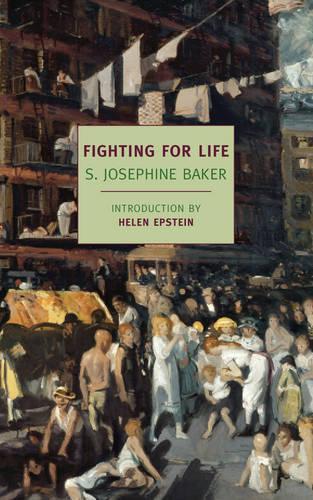
Fighting For Life
(Paperback, Main)
Publishing Details
Fighting For Life
By (Author) S. Josephine Baker
New York Review Books
NYRB Classics
15th September 2013
Main
United States
Classifications
General
Non Fiction
610.92
Physical Properties
Paperback
304
Width 16mm, Height 204mm, Spine 130mm
317g
Description
New York's lower east side was said to be the most densely populated square mile on the face of the earth in the 1890s. City health inspectors called the neighborhood "the suicide ward" and referred to one particular tenement-in an official Health Department report, no less-as an "out and out hog pen." Diarrhea epidemics raged each summer, killing thousands of city children. Sweatshop babies with smallpox and typhus dozed in garment heaps destined for fashionable Broadway shops. Desperate mothers paced the streets to soothe their feverish children, and white mourning cloths hung from every building. A third of children living in the slums died before their fifth birthday. By 1911, the child death rate had fallen sharply and The New York Times hailed the city as the healthiest on earth. In this witty and highly personal autobiography, public health crusader Dr. Sara Josephine Baker explains how this remarkable transformation was achieved. By the time she retired from the New York City Health Department in 1923, Baker was famous worldwide for saving the lives of 90,000 children. The public health programs Baker developed, many still in use today, have probably saved the lives of millions more. She also fought for women's suffrage, toured Russia in the 1930s, and captured "Typhoid" Mary Malone, twice. She was also an astute observer of her times, and Fighting for Life is one of the most honest, compassionate memoirs of American medicine ever written.
Reviews
The fact that [Baker] achieved so much professionally as a woman in the medical field is made more impressive by the fact that in 1900, only 6% of physicians were women. . . . The public health crusader was also a suffragette and a feminist who was with her female life partner, the writer Ida Wylie, from 1920 until her death in 1945. . . . At a time when New York City and the rest of the world are dealing with another public health crisis, Dr. Bakers commitment to serving the most vulnerable among us is an important reminder. Sarah Prager,them.
Baker was the first director of a childrens public health agency, and the first woman to get a doctorate in public health. She tangled repeatedly with Typhoid Mary. More important, her ideas saved thousands of lives and permanently changed the focus and mission of public health. Her just-reissued 1939 autobiography proves to be one of those magical books that reaches effortlessly through time, as engaging and as thought-provoking as if it were written now. The New York Times
Dr. Baker shines not only for her contributions to public health and social policy, but also for her work as a woman in government administration, supervising a staff that included many male physicians. Her work made her a leading figure in public health and the New York City Bureau of Child Hygiene became a model for similar programs in other cities, as well as for the United States Childrens Bureau. U.S. National Library of Medicine
Rather than spending her time swanning about town, Josephine Baker became a pioneer, dedicating her life to the field of preventive health care for children. Anthony Bourdain
Author Bio
S. JOSEPHINE BAKER (1873-1945) was a pioneering American public health physician and the first director of New York's Bureau of Child Hygiene. Her work with poor mothers and children in the immigrant communities of New York City had a dramatic impact on maternal and child mortality rates and became a model for cities across the country. On two occasions she helped to track down the infamous "Typhoid Mary," the cook who had spread the disease while working in several New York households. The first woman to earn a doctorate in public health from New York University-Bellevue Hospital Medical School, Baker wrote fifty journal articles and more than two hundred pieces for the popular press about issues in preventive medicine, as well as six books: Healthy Babies (1920), Healthy Mothers (1920), Healthy Children (1920), The Growing Child (1923), Child Hygiene (1925), and her autobiography, Fighting for Life (1939). HELEN EPSTEIN is an independent consultant and writer specializing in public health in developing countries, and an adjunct assistant professor at the Columbia University School of International and Public Affairs. She has advised numerous organizations, including the United States Agency for International Development, the World Bank, Human Rights Watch, and UNICEF. She writes frequently for various publications, including The New York Review of Books, The New York Times Magazine, and Granta, and is the author of The Invisible Cure: Why We Are Losing the Fight Against AIDS in Africa.
